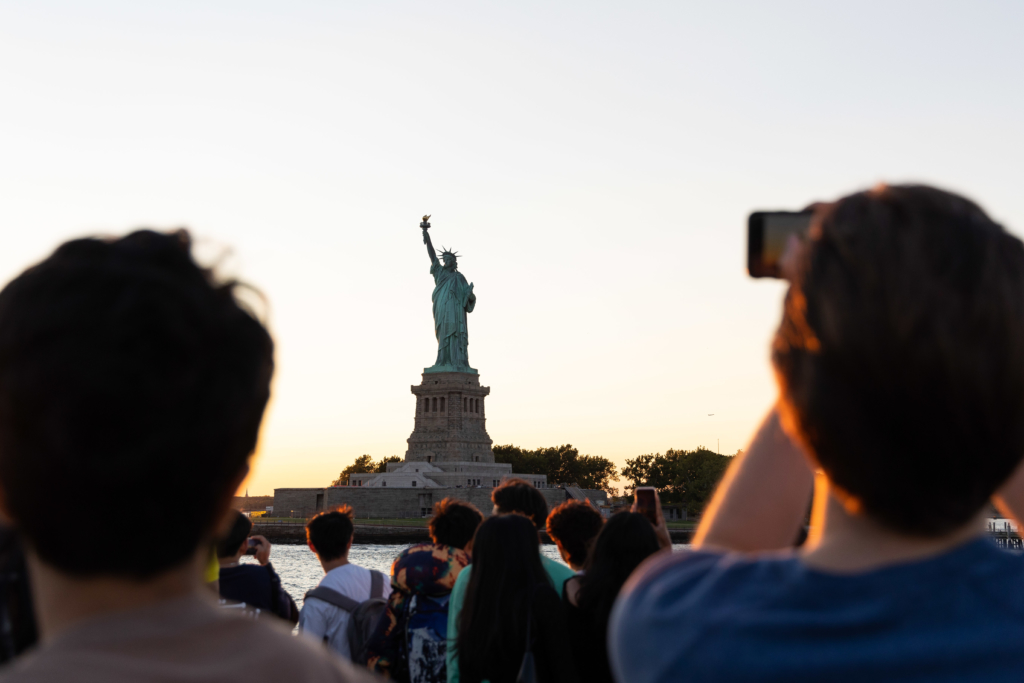
To build community, Stern introduced its new Stern Signature Experience program to undergrads this year. Here, Stern juniors pass the Statue of Liberty on their way to Ellis Island, which the school rented out to prompt students to craft and share their own stories. Courtesy photos
In November 2019, NYU’s Stern School of Business embarked on a rebranding exercise. Its new tagline — “Change. Dare it, dream it, drive it” — serves as a call to action for Stern students living in a world changing at hyper-speed.
It’s also a guidepost for how Stern thinks of itself, Robert Whitelaw, vice dean of Stern’s undergraduate college, tells Poets&Quants — and what it hopes to achieve as an educational institution.
Anyone remember what happened next? Something about a once-in-a-lifetime pandemic that closed university campuses across the world, and forced everyone from employers to parents to top-tier business schools to find completely new ways of doing things.
“That tagline turned out to be very prescient,” Whitelaw says. “In a weird sense, we got a little bit lucky with the timing.”
EMBRACING CHANGE IN UNDERGRAD BUSINESS SCHOOL
Besides closing classrooms, halting travel, and ending in-person meetings, the pandemic also gave Stern the chance to re-evaluate some of its most impacted programs.
Stern is ending its International Study Program (ISP) which requires each of its nearly 600 juniors to embark on an international study trip as part of their capstone course. It is instead taking three of the most important aspects of ISP – the global experience, the capstone course, and community building – and reinventing them into three new innovations for the undergraduate program.
Stern thinks of itself as pioneers in business education, Whitelaw says. ISP was a pioneering program when it started nearly two decades ago, though it’s been mimicked by other top undergrad programs since. But one lesson of the pandemic is that large-scale travel isn’t going to look the same as it did pre-pandemic.

Stern vice dean Robert Whitelaw introducing the theme of ‘Adventure’ to Stern seniors prior to their Stern Signature Experience trip to the Intrepid Sea, Air & Space Museum this fall. Courtesy photo
One of Whitelaw’s favorite phrases to come out of the rebranding exercise was “excellence unbound by tradition,” a suggestion that never quite rose to the top, but one that he still uses as a tagline for his Stern email signature.
“An advantage we have at NYU is we don’t have a 400-year history; We’re not wedded to doing the things the way we used to do them. New York City is all about reinventing yourself,” he says.
“I think we’ve taken to heart this idea, and of course it’s driven in part by (Stern) Dean (Raghu) Sundaram. Prior to being what I would call Dean Dean, he was actually dean of the MBA program. So he is very big on innovation.
“And we’ve seen, I think, a dramatic level of innovation at the school over the last five to 10 years. It’s partly something that we’re embracing, but partly in response to all the changes that are happening — whether it’s about technology, the pandemic, or what have you. That’s what motivated some of the specific changes in the undergraduate program.”
Poets&Quants for Undergrads spoke with Whitelaw about the three major innovations coming for Stern undergraduates, some of which have already been implemented, some that are coming soon. Whitelaw is the Edward C. Johnson 3d Professor of Entrepreneurial and Finance and has taught at Stern for 30 years. Our conversation has been edited for length and clarity.
Tell me about the move to retire Stern’s ISP program.
One of the good things about the pandemic was, weirdly, that we shut down a number of the things that we were doing because, for example, we didn’t have students here. It was a chance to actually take a step back and think about why we were doing something and how it would work in a post pandemic world.
Twenty years ago, we invented this program called ISP, the International Study Program. Global is one of our five academic pillars – academic, social impact, global, professional, and community. It sort of defines the things that we think are important when we think about our program and the student experience. Global is a really big part of that.
I believe we were the first school to basically commit to all of our students having an authentic global experience. Essentially, the whole junior class took this course that included a one week trip — 200 students going to South America, 200 to Asia, 200 to Europe, for example. That was an amazing innovation, it was a wonderful program, and a really nice illustration of our commitment to global.
During the pandemic, that opportunity disappeared. Basically, we think that kind of large scale travel is not coming back. There’s too much uncertainty, too much risk associated with these really big, large scale trips. So we reinvented our commitment to global.
ISP was doing three things for us: It was, essentially, our capstone course; it was the authentic, global experience for all of our students; and it was a community building course because all the students were traveling together. We knew that we absolutely could not lose those things. So, if we were going to reinvent, we wanted to do them better. We wanted to see if there was a way to increase flexibility, add more student choice, and allow students to customize the experience a little more to their interests.
NEXT PAGE: A new capstone course for all Stern seniors + Three ways to get global experience











Questions about this article? Email us or leave a comment below.